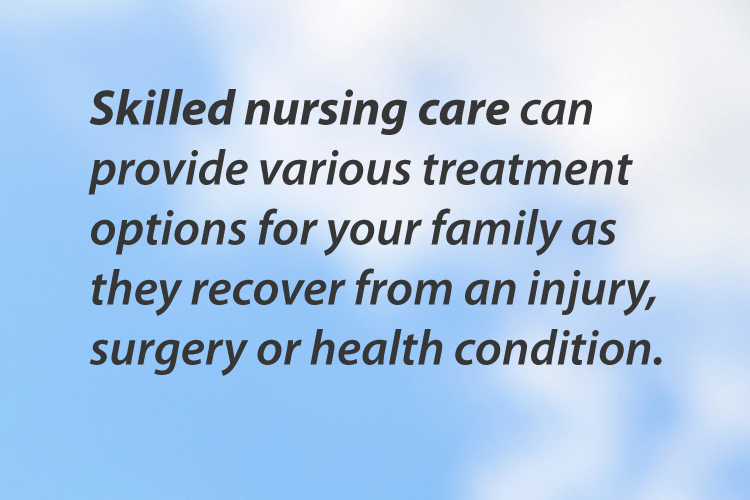
Posted: March 11, 2024
Skilled nursing care can offer a variety of treatment and support services to strengthen skills needed in the everyday lives of older adults, depending on their physical and mental health circumstances. Medical care and overall satisfaction with life are top priorities for these expert teams of skilled nurses and professional therapists, who work around the clock to provide quality support and therapy for all residents.
If your loved one has been injured or lives with a health condition that requires daily medical or therapeutic care, they may benefit from the assistance provided by this specialized team. There are many critical factors to evaluate before diving into the admission process of a skilled nursing care facility.
Many assume that skilled nursing care facilities and assisted living communities are the same. While older adults can receive assistance with completing everyday activities in both settings, skilled nursing communities focus on providing treatment services in a secure medical environment with licensed nurses and medical professionals. Alternately, assisted living prioritizes residential services and support activities of daily living, such as dressing, medication reminders, or meal preparation.
Skilled nursing care provides around-the-clock medical supervision and treatment for those recovering from an injury or continuing health conditions. The team members at skilled nursing communities offer quality medical treatment tailored to each individual’s needs. Skilled nursing includes services such as close monitoring of vital signs, assistance with transfers, medication administration and wound care, as well as physical, occupational and speech therapy.
With either short-term and long-term care, staff will assess each resident’s needs before care and rehabilitation begin to structure treatment and exercises around their goals and current limitations. Nurses monitor the progress made during this time to customize care plans to best suit their recovery process and personal goals and desires.
The most common reason for admission to a skilled nursing facility is that someone is unable to safely return home and will require assistance and medical support during their recovery, and possibly for the long term. Recovery is different for everyone, depending on their injuries or mental health. The top priority at a skilled nursing community is the supervision of progress and treatment that each resident receives.
Skilled nursing is needed when older adults are in need of daily medical care and treatment, whether from an injury, health crisis, or ongoing health condition. Commonly, skilled nursing care is beneficial following a stroke, cardiac event, surgery, or other injury or illness. Chronic conditions may also typically require constant medical attention.
Older adults can also benefit from services offered in skilled nursing facilities to improve their mobility or motor, cognitive or speech skills. Residents spend time strengthening their minds and bodies to relearn how to go about their day-to-day lives.

If your loved one would benefit from daily treatment and medical care, trained medical professionals can help care for their physical and mental needs. You may discover that their needs exceed the care you can provide each day. Rest assured that you are not alone on this journey.
Skilled nursing care can provide various treatment options for your family members. While these facilities can offer aid in many forms, the type of service an older adult receives is customized based on their individual needs.
Your loved one should consider skilled nursing care if they experience the following occurrences:
In order to qualify for a short-term rehabilitation stay in skilled nursing care, one must first have a qualifying hospital stay of at least three consecutive midnights. If their physician recognizes the need for skilled nursing care, Medicare can help pay for short-term recovery at a facility. A short-term stay includes up to 100 days of daily treatment from skilled nurses and professional therapists, starting from the first day of admission to the skilled nursing facility.
Qualifications for skilled nursing care under Medicare typically revolve around a resident’s ability to care for themselves and safely return home after treatment at a hospital. Suppose they face challenges with communicating, walking or eating on their own, or require wound care or monitoring of their vital signs. In that case, a physician will likely offer more information about a trusted skilled nursing facility to ensure the resident receives proper rehabilitation to enhance these capabilities during and after recovery.
Once your loved one receives the green light for admission to a skilled nursing care facility, assessing the costs of services can be an essential step to consider. Medicare can provide aid in paying for skilled nursing care services for up to 100 days. Your loved one will be eligible to receive treatment with financial assistance for this period of time if their doctor has directly stated their need to receive care from a facility and their recovery is progressing throughout their stay.
Medicare will cover services such as:
While Medicare will generally not cover long-term care, there are a number of different options available for paying for extended care. Some common ways to pay for long-term skilled nursing care include:
In addition to medical care, skilled nursing also includes different forms of rehabilitation tailored for each resident’s needs. Depending on a person’s health conditions and how that may impact their movement or speech, they can partake in one or more of these practices to strengthen their skills.
Physical therapy focuses on helping residents recover from an injury, surgery or illness that has limited their mobility. The rehabilitation team will prescribe various physical exercises to help build muscle and make moving easier for the resident. This type of care is temporary until the individual can move again independently.

Occupational therapists (OTs) help seniors complete daily tasks such as getting dressed, moving on their own and eating. This practice allows older adults to strengthen their motor skills over time. OTs can also help to refine a resident’s cognitive skills through memory training, coordination exercise and mental activities.
Speech-language pathology helps older adults with speech and language challenges. Older adults who benefit from these practices have health conditions or injuries that limit their speaking abilities. Nurses in this field can also help those who have difficulty swallowing properly.
Communication is a vital skill to have in the later stages of life, and Speech-Language Pathologists take great care to provide exercises to enhance these capabilities over a period of time.
At Someren Glen, we treat your loved one like family. Our skilled nursing care services ensure a comfortable stay and quality rehabilitation for those recovering from surgery, an injury or a health condition.
Someren Glen’s skilled nursing care allows residents to enhance their cognitive and motor skills and receive assistance with everyday activities. Normalcy and companionship are our top priorities for every resident as they begin to rediscover their capabilities through quality rehabilitation.
Assisted and independent living options are available for older adults without the need for around-the-clock medical care. This environment provides opportunities to grow and find new satisfaction in life through physical activities, opportunities to socialize with neighbors and family, trips to the surrounding areas and the peace of mind of nursing and rehabilitation services should the need arise.
Contact us today to start your loved one’s journey to recovery.